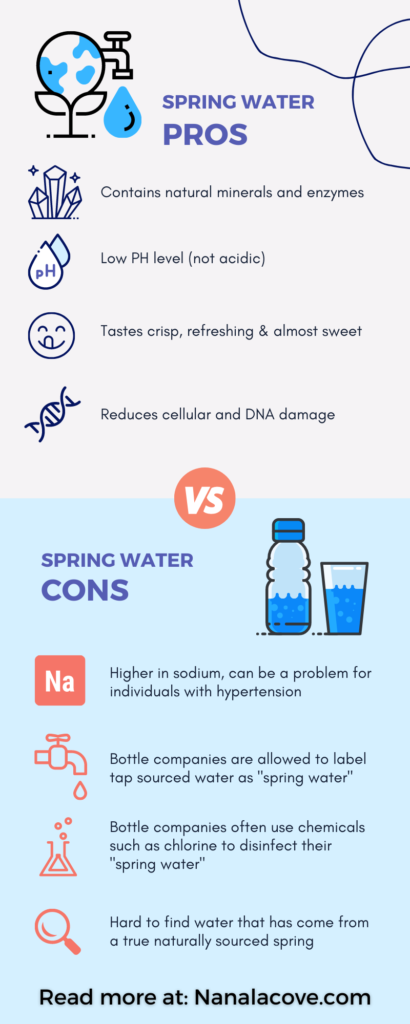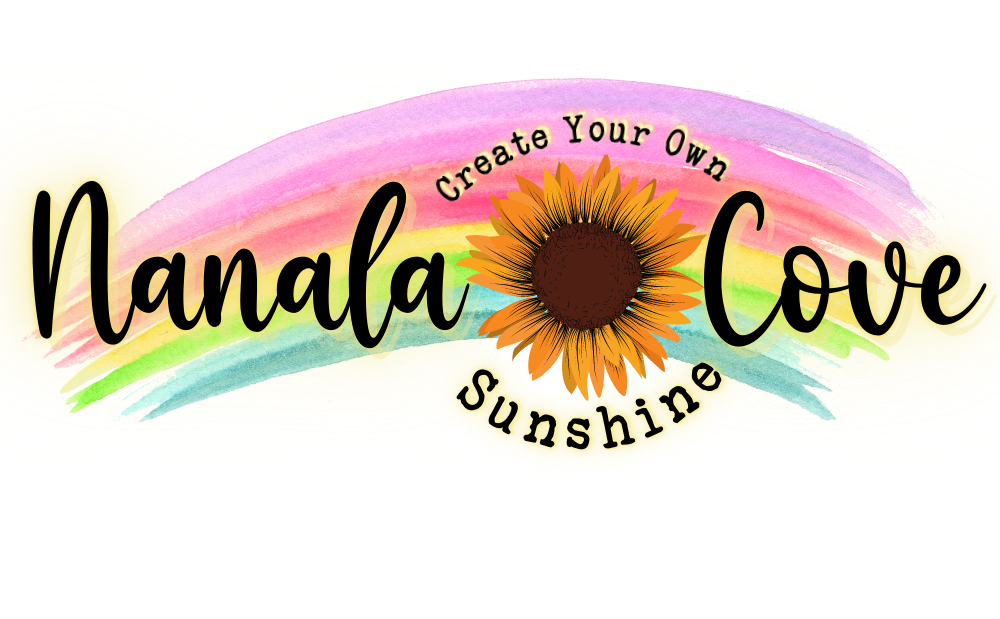What Is Spring Water?
Spring water comes from an underground origin (AKA: a spring!). You can obtain this nutrient enriched water in one of two ways. The first, is by drilling directly into the spring source. The second way to bottle spring water, is by simply collecting it from the earth’s surface.
There are three sources of springs. They are known as: natural springs, mountain springs, and artesian springs.
Truly pure springs will give you sparkling clean, refreshing water! Something you might not know, is that this spring water will also be abundant with natural and essential minerals. Since spring water in one of the purest of it’s kind, many people prefer it’s crisp and invigorating taste over all other types of water.
The Problem With Tap Water.
Personally, I used to see nothing wrong with drinking tap water if it looked, smelled and tasted fine. However, my research brought me to the conclusion that spring water ranks far above all other waters- but especially tap water!
As it turns out, tap water comes from man made water treatment facilities. Many of these factories use varying types of chemicals to disinfect (such as chlorine). Chemicals like chlorine can be problematic when they mix with other by-products in the water. This is because the mixing results in the production of even more chemicals. These chemicals, known for causing life threatening conditions such as cancer and kidney disease, can be extremely detrimental to your health.
Why Is Water A Key To Survival?
Did you read my post, 27 Reasons To Drink More Water? In that post, I discussed in detail how 60% of our bodies is made up of water. Not only that- but our brains, hearts, lungs, skin, muscles, kidneys and even our bones depend on optimal water intake in order to thrive! This means that drinking purely sourced water (such as those found in natural springs) could mean even more benefits to our health than we could possibly imagine.
Studies reveal that the cleaner water we drink, the more efficient our bodily systems will operate. In addition to ensuring optimal function of our organs, water also: assists the digestive system, improves communication between cells, aids skin health, decreases brain fog, detoxifies the body, and many other health benefits.
When we don’t get enough water, this leads to dehydration. The problem with dehydration is that it creates a sort of domino effect within the body. The first sign of being in a dehydrated state starts with a headache, joint pain, dry eyes, anxiousness, confusion, dry skin, and low energy levels. Dehydration can leave your muscles feeling especially weak and fatigued due to the fact that they are composed of 75% water.
Pros: Health Benefits of Spring Water.
Not only does water help our bodies function and operate as they’re meant to, but it offers a multitude of additional health benefits as well!
Spring water contains essential minerals, such as: magnesium, potassium, calcium, sodium, as well as small quantities of iron and zinc. The cool thing about these minerals is that they are able to be absorbed extremely easily, due to them being in ionic form! Also, the presence of these naturally created minerals is what easily puts spring water above all the rest.
Another pro to drinking spring water, is that it’s PH level is generally neutral or alkaline. Drinking alkaline water is a great way to strengthen your bones, teeth, skin and hair. It also helps to neutralize your body from free radicals and acidity . But it gets better! The World Health Organization has said that heart and bone conditions, such as cardiovascular disease and osteoporosis, could be reduced by taking in mineral rich water. Namely, waters containing high levels of magnesium and calcium. (Spring water fits this bill!)
Top 9 Benefits of Drinking Spring Water:
- Contains natural minerals
- Has NO chemicals
- Low PH level (not acidic)
- Tastes crisp, refreshing and almost sweet
- Stronger bones
- Healthier teeth
- Lowers risk of heart disease
- Better functioning immune system
- Reduces cellular and DNA damage
Cons: Health Concerns Of Drinking Spring Water.
Now we’re going to take a look at the cons associated with drinking spring water. First of all, consuming sodium can be a real problem for those with hypertension. However, the good news is that you can still find low sodium options for spring water!
Another thing to be aware of, is that unless you have access to a local fresh and pure spring- you’re most likely going to have to opt to purchasing it in bottled form. And this is where the real cons can come into play.
The Secrets Hiding Within Bottled Water.

The FDA oversees the regulation of bottled water. Sounds great at face value, right? But in fact, the FDA has openly admitted to allowing manufacturers to label and market products as spring, mountain and glacier water- regardless of if it truly came from these natural sources! Many of the bottled “spring water” on shelves, has actually been sourced from tap water.
Ah, marketing, the great deceiver.
And as if it’s not enough to make you question the bottled spring water found in stores, these companies also use chemical such as chlorine to disinfect their water!
So, the moral of the story here? Your best bet is to find a supplier you know and trust to provide you with clean, naturally sourced water. Or if you live near a local mountain spring, even better.
Here’s questions to have answered before you buy your next bottle(s) of water:
- Where was the water is being collected from?
- Where is this water being bottled?
- How do they disinfect their water? (This will help you determine what, if any chemical are being used.)
The bottom line is this. You really can’t depend on marketing labels to supply you with factual information. However, you can find out all you need to know by taking the time to research the companies! You can easily do this by looking into them online, or even calling them directly.
How Much Water Should You Drink a Day?
You now know just how beneficial (and even necessary) getting your daily dose of water is. Preferably purely sourced spring water. The last thing to assess, is just how much water you should be getting on a day to day basis.
While getting eight cups of water a day is a good start, we are not identical beings and as is true for most things in life- our needs are individual and more complex than that.
If you’re up to doing some math calculations on your own, then here’s a step by step process to find out how much water you need:
- Divide your weight in pounds by 2.2.
- Multiply that number by your age.
- Divide that number by 28.3.
- The total is how many fluid ounces you should be drinking of water a day.
Or you can instead just use an automated water consumption calculator, like the one here. (I know, why didn’t I suggest that sooner lol.)
Let’s Wrap Things Up.
In summary, spring water is arguably one of the most health edifying waters you can drink. It offers all the benefits of drinking enough water, and more! However, in order to obtain all the pros and avoid the cons of drinking this mineral rich liquid- you need to be sure you’re consuming the real thing.
My favorite bottled spring water is Waiakea Hawaiian Volcanic Water. Full of important minerals & electrolytes, and packaged in recycled bottles!
What’s your favorite brand of spring water? Leave your recommendations in the comments below!
Be the first to receive tips, tools and specials- don’t forget to subscribe below to the Nanala Cove newsletter 🙂


I didn’t know there is such a thing as spring water. Thanks for sharing this.
I didn’t realize the differences! Now I understand why spring water tastes so much better than all the others 🙂
I am fortunate to live in a city that ranks highly for their quality of water , but you are right about the nutrients and presence os chemicals, so I will be looking into spring water.
I’ll be opting for spring water whenever it’s an option from now on!